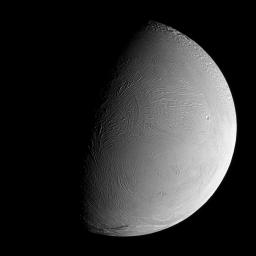
|
Youthful Wrinkles
- Click the image above for a larger view
- Full-Res JPEG (900 x 900) (71.6 kB)
- Full-Res TIFF (900 x 900) (811.0 kB)
Caption:
During a distant flyby encounter with Enceladus, Cassini imaged the moon's wrinkled leading hemisphere. At the scale visible here, this region of the surface is generally devoid of impact craters, suggesting that the terrain has been modified and renewed during the moon's history.
To the north lies a heavily cratered and presumably older region. The sinuous boundary of the geologically active south polar region is seen at bottom. North on Enceladus (504 kilometers, 313 miles across) is toward the top of the image.
The image was taken in visible green light with the Cassini spacecraft narrow-angle camera on Sept. 30, 2007. The view was acquired at a distance of approximately 108,000 kilometers (67,000 miles) from Enceladus and at a Sun-Enceladus-spacecraft, or phase, angle of 75 degrees. Image scale is 644 meters (2,111 feet) per pixel.
Background Info:
The Cassini-Huygens mission is a cooperative project of NASA, the European Space Agency and the Italian Space Agency. The Jet Propulsion Laboratory, a division of the California Institute of Technology in Pasadena, manages the mission for NASA's Science Mission Directorate, Washington, D.C. The Cassini orbiter and its two onboard cameras were designed, developed and assembled at JPL. The imaging operations center is based at the Space Science Institute in Boulder, Colo.
For more information about the Cassini-Huygens mission visit http://saturn.jpl.nasa.gov/ . The Cassini imaging team homepage is at http://ciclops.org .
Cataloging Keywords:
| Name | Value | Additional Values |
|---|---|---|
| Target | Enceladus | |
| System | Saturn | |
| Target Type | Satellite | |
| Mission | Cassini-Huygens | |
| Instrument Host | Cassini Orbiter | |
| Host Type | Orbiter | |
| Instrument | Imaging Science Subsystem (ISS) | |
| Detector | Narrow Angle Camera | |
| Extra Keywords | Crater, Grayscale, Impact, Visual | |
| Acquisition Date | ||
| Release Date | 2008-10-03 | |
| Date in Caption | ||
| Image Credit | NASA/JPL/Space Science Institute | |
| Source | photojournal.jpl.nasa.gov/catalog/PIA10483 | |
| Identifier | PIA10483 | |
